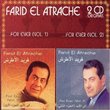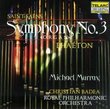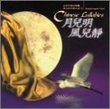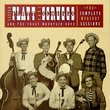| All Artists: Alexander Glazunov, Aram Khachaturian, Sergey Prokofiev, Yakov Kreizberg, Russian National Orchestra Title: Russian Violin Concertos [Hybrid SACD] Members Wishing: 2 Total Copies: 0 Label: Pentatone Release Date: 12/14/2004 Album Type: Hybrid SACD - DSD Genre: Classical Styles: Chamber Music, Forms & Genres, Concertos, Historical Periods, Classical (c.1770-1830), Modern, 20th, & 21st Century, Instruments, Strings Number of Discs: 1 SwapaCD Credits: 1 UPC: 827949005961 |
Search - Alexander Glazunov, Aram Khachaturian, Sergey Prokofiev :: Russian Violin Concertos [Hybrid SACD]
![Russian Violin Concertos [Hybrid SACD]](https://nationalbookswap.com/cd//l/67/2367/6122367.jpg) | Alexander Glazunov, Aram Khachaturian, Sergey Prokofiev Russian Violin Concertos [Hybrid SACD] Genre: Classical |
Larger Image |
CD DetailsSimilar CDs
Similarly Requested CDs |
CD Reviews3 Russian Violin Ctos - Verve, Lilt, Dash, & Elegance Dan Fee | Berkeley, CA USA | 07/15/2005 (5 out of 5 stars) "Julia Fischer is a violinist whose name is news to me, but then, What good news she is. Like the young Anne Sophie Mutter, she appears to have sprung whole from the head of Jove. She plays with a simply huge command of her instrument, and she grasps the music in both local nuances and larger paragraphs. Her intonation and fingerwork and bowing are well nigh faultless, so far as I can hear. She has a sort of wicked ease that actually might remind an older listener of the late, great Heifitz. He used to tell his student violinists to warm up by playing fingered octaves, which is rather like telling people to start just where most others are leaving off in happy achievement. Nowhere are these capabilities put to better use than in her resuscitation of the much hackeneyed Khachaturian concerto, which she has the gruff to play as her opening. She obviously loves playing it, and has such a good time that it is quite easy to forget all the kitsch renderings you may have heard over the years. The RNO under Yakov Kreizberg (who is also a rising star among conductors now active in Europe) keep up with Julia all the way. Somehow all the flash just sounds scintillating, and the orientalisms just sound atmospheric and colorful. You think in some beautiful spots that Khachaturian knew what he was doing, after all. Then Julia and company move on to the Prokofiev first violin concerto, and make deft, stunning magic of it, too. Again she and the conductor and the orchestra demonstrate remarkable unanimity of musical purpose. And, they have a good time with the Prokofiev, shattering our stuffy stereotypes that genius in classical western music is always tendentious, fat, and dressed in over-starched shirts with very stiff collars. Thirdly, we get the Glazunov concerto. This, too, benefits from a completely fresh and straightforward reading, rooted in the players love of the music. Julia realizes the more brilliant moments of the Glazunov without forgetting that its heartfelt pusle is mainly lyrical, and her lyrical is so lithe and athletic that you don't feel for once that Glazunov was tempted to outstay the melodic welcomes embodied in his main themes. The SACD surround sound is equally wonderful. It completely serves the music and the musicians, without calling attention to itself. You simply get a good, multichannel sense of everybody, including Julia, the super RNO as a whole body and as an unnervingly talented nexus of virtuosos, and of course, of conductor Kreizberg. The hall acoustic adds air and resonance, which is quite an accomplishment considering that we are talking about a recording studio and not one of the historic Moscovite venues like Tchaikovsky Hall at the conservatory. If you like superior violin playing that is above all musical, with an orchestra and conductor that can keep up with such a soloist; then this disc will do fine. Five stars, fading into sunrise pinks and whites and blues. Where did the slow night go? Oh, well, play that SACD again, will you? PS. Keep your ears and eyes on the lookout. Julia Fischer is now an exclusive Pentatone artist, and Yakov Kreizberg, maybe, too." An Impressive Début Disc J Scott Morrison | Middlebury VT, USA | 07/26/2006 (5 out of 5 stars) "Although this is not the young Julia Fischer's first recording, it is the first she has done in SACD format on the PentaTone label with whom she has signed as an exclusive artist. The CD came out in late 2004, if I'm not mistaken, and she has since released the Bach Partitas and Sonatas, and most recently a disc of Mozart Violin Concerti. I gave a rave to the latter here at Amazon. I had not heard this début disc until recently and was, I will admit, a little concerned that she might be too 'classical' a violinist to make the most of these mostly extrovert Russian concerti. I was wrong to have any hesitation; she plays them with verve, wit, style and plenty of extroversion where needed. But she also brings to them an inwardness -- particularly in the Prokofiev First, which certainly has a veil of mystery about it -- that makes them seem fresh. In recent times the Khachaturian Concerto has to some extent fallen from favor. When I was a youth it was one of the big modern Russian concerti along with Prokofiev 2 and, late in the 1950s, the Shostakovich 1, and one heard it in concert with some regularity. Happily there has been a bit of a revival lately, in spite of the tendency of some critics and programmers to think it is rather lightweight and too much of a populist work. Whatever the drawbacks it might have, it is an extremely effective piece with plenty of Khachaturian's Armenian flavorings, lots of rhythmic interest and virtuosity galore. Fischer brings to it a musicianly concern for dynamic subtlety and nuanced phrasing along with complete mastery of the concerto's technical difficulties. She eschews the Oistrakh edition of the concerto -- he extended the first movement cadenza and cut some measures in the finale -- and uses Khachaturian's original version. This is a first-class performance of a wonderful concerto which is worth one's attention. One cannot but adore Prokofiev's First Violin Concerto. And one cannot say enough about the masterful orchestration Prokofiev provides, with harp intertwined with violin harmonics and extraordinarily plangent woodwind writing. The Russian National Orchestra, a group formed not long after the breakup of the Soviet Union and the stirrings of a new freedom in Russia, is a marvelous group. Their conductor here is Yakov Kreizberg, incidentally the brother of the probably better-known conductor Semyon Bychkov, who is making a very favorable impression these days. I've heard a number of his recent recordings and am mightily impressed with his formally clear approach that is, ironically, coupled with a really poetic sensibility. Clarity and poetry make wonderful partners in his recordings. Both Kreizberg and Fischer show us the darker side of the Prokofiev and in the process present it as the lyrical yet fierce work it is. Glazunov's concerto is a late Romantic work in one movement. It is notable for its heartfelt lyricism, gorgeous tunes, and the equality of the orchestral principals with the violin soloists. It is really more like a symphony with violin obbligato, particularly in the long and lovely andante middle section. That aspect of the work is emphasized here and one must give credit to Fischer and the recording engineers for allowing that to shine through. Fischer is more generous, even self-effacing, in this than some soloists in other recordings the concerto has had (Perlman, Heifetz) and this is to the benefit of the work's effect. (A comparable concerto, to give you some idea of what I mean, is Brahms's Second Piano Concerto where the piano is not always the spotlighted star.) This is a genial reading with Fischer's burnished tone riding above and around the contributions by the orchestra. The folksong aspects of the finale are emphasized and one is left with a kind of uplift that makes one want to start the concerto all over again. This is, make no mistake, a marvelous disc and I cannot recommend it highly enough. In addition, all three concerti are given strikingly lifelike sound. Scott Morrison" THE FUTURE IS IN GOOD HANDS GEORGE RANNIE | DENVER, COLORADO United States | 01/02/2007 (5 out of 5 stars) "The very young Violinist Julia Fischer demonstrates in this recording that (to me) the future for the performance of masterpieces of so-called classical music is very bright indeed. Julia gives very sensitive, virtuosic, and beautiful in tone performances of these Russian concertos for the violin. She is rhythmically astute in the Khachaturian concerto and very gorgeous in tone in the overtly romantic Galazunov concerto. Likewise, the Prokofiev's First Violin Concerto is given a finally nuanced performance with Yukov Kreizberg leading the Russian National Orchestra splendidly.
I heard Ms. Fischer in Aspen, Colorado in the summer of 2006 and was very impressed with her; this recording certainly confirms that most favorable impression. If you want to hear some great violin playing, buy this disc. By the way, the recorded sound is great-- very full and rich! " |





